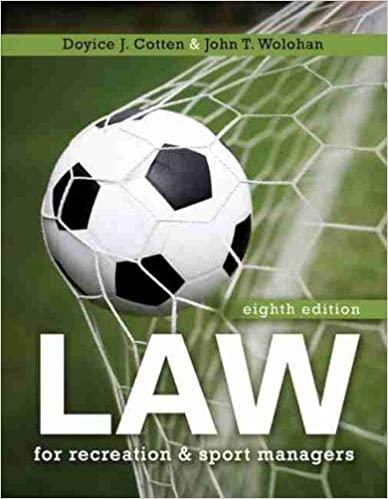Question
BLAW-3310-003-LEGAL/ETHICAL BUS ENVIRONMENT 1.Sole proprietorships must register with their state government to be able to operate a business legally. A. TRUE B. FALSE 2.Partnership agreements
BLAW-3310-003-LEGAL/ETHICAL BUS ENVIRONMENT
1.Sole proprietorships must register with their state government to be able to operate a business legally.
A. TRUE
B. FALSE
2.Partnership agreements must always be in written form.
A. TRUE
B. FALSE
3.If a general partnership is governed by dissociation, and the partnership has at least three partners. the partnership will continue even if a partner withdraws.
Group of answer choices
a. true
b. false
4.As with a general partnership, all partners in a limited partnership have unlimited personal liability for the debts of the business venture.
a. true
b. false
5.Directors are shielded from liability for informed business decisions made in good faith and in the best interest of the corporation by the:
a.prudent director rule.
b.business judgment rule.
c.reasonable director rule.
d.good faith rule.
6.The voluntary dissolution of a corporation is approved by the shareholders and board ofdirectors.
Group of answer choices
a.True
b.False
7.Limited liability companies are taxed like partnerships, and have the liability rules of a corporation.
a.True
b.False
8.Because of dissociation, if a member of a limited liability company with several members dies, the company must terminate.
a. True
b. False
9.In a corporation, the profits are taxed and then the profits are taxed again when paid to the shareholders, so there is double taxation of corporate profits.
a. true
b. false
10. The phrase "piercing the corporate veil" refers to:
a.the ignoring by courts of the corporate entity in order to do justice.
b.the technique of getting past the receptionist to see the purchasing manager of thecorporation.
c.inspecting the books of the corporation.
d.learning the identities of the shareholders of the corporation.
11.A negotiable instrument may be transferred in two basic ways. If the instrument is made "to the order" of the payee, the payee must (1) endorse the instrument and (2) deliver the instrument to a third party. If the instrument is made "to bearer," the party in possession of the instrument is required only to deliver it to transfer it.
a. true
b. false
12.A holder in due course must three requirements.They are:
a.value, good faith, no notice of defects.
b.consideration, good faith, value.
c.good faith, notice of defects, value.
d.none of the above.
13.The drawer owes money to the drawee in a negotiable instrument.
Group of answer choices
a.True
b. False
14.The parties to a negotiable promissory note are the:
a.maker and the drawee.
b.drawee and the drawer.
c.drawer and the payee.
d.maker and the payee.
15.One of the most common defenses a surety may raise is that material changes were made to the debt contract, thus releasing the surety.
a.True
b.False
16.One of the most common defenses of sureties is bankruptcy of the principal debtor.
a. true
b. false
17.Most security interests are perfected when filed for public inspection with the secretary of state, county clerk, or similar official.
a. true
b. false
18.A floating lien allows a secured creditor to have a security interest in a changing or shifting stock of the buyer's goods.
a. true
b. false
19.People who have above average income are more likely to use Chapter 13 bankruptcy rather than Chapter 7.
a. ture
b. false
20.Under a Chapter 11 reorganization, the debtor acts as a trustee.
a. true
b. false
21.All valid agency relationships are contracts.
a. true
b. false
22.An agency that is for the sale of land usually must be evidenced by a writing.
a. true
b. false
23.In the absence of an agency relationship in fact, when a principal's conduct appears consistent with the existence of an agency relationship, an agency by estoppel may be created.
a. true
b. false
24.Apparent authority arises when the principal creates an appearance of authority in an agent that leads a third party to conclude that the agent has authority to act for the principal.
a. true
b. false
25.An agent should commingle the property of the principal with the property of the agent because the agent's interests coincide with and are directly related to those of the principal.
a. true
b. false
26.An agent making a proper contract with a third person on behalf of a disclosed principal:
a.has no personal liability on the contract.
b.is liable only to the principal on the contract.
c.is liable only to the third party on the contract.
d.is personally liable to both the principal and the third person.
please somone help i need to pass
Step by Step Solution
There are 3 Steps involved in it
Step: 1

Get Instant Access to Expert-Tailored Solutions
See step-by-step solutions with expert insights and AI powered tools for academic success
Step: 2

Step: 3

Ace Your Homework with AI
Get the answers you need in no time with our AI-driven, step-by-step assistance
Get Started


